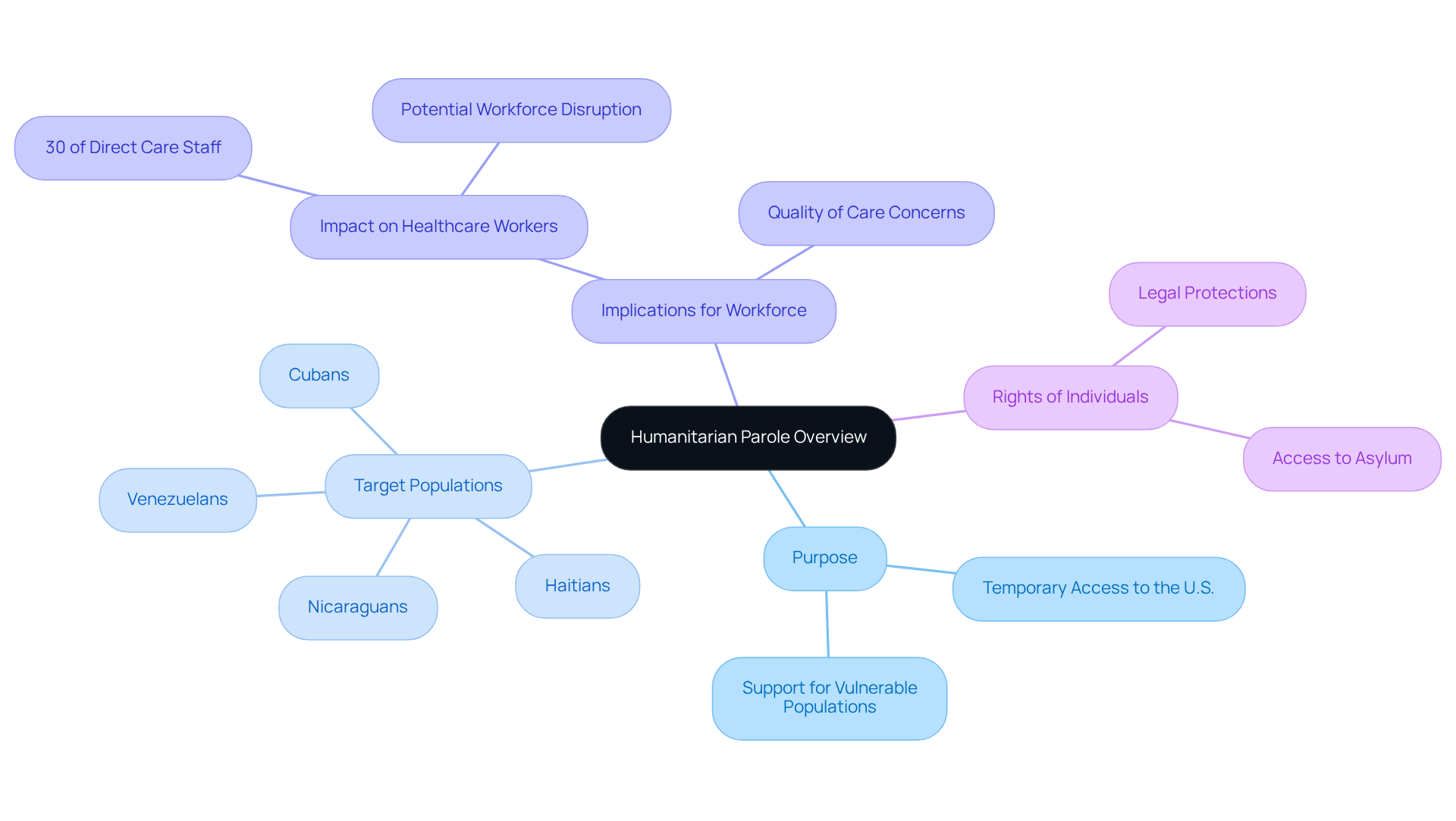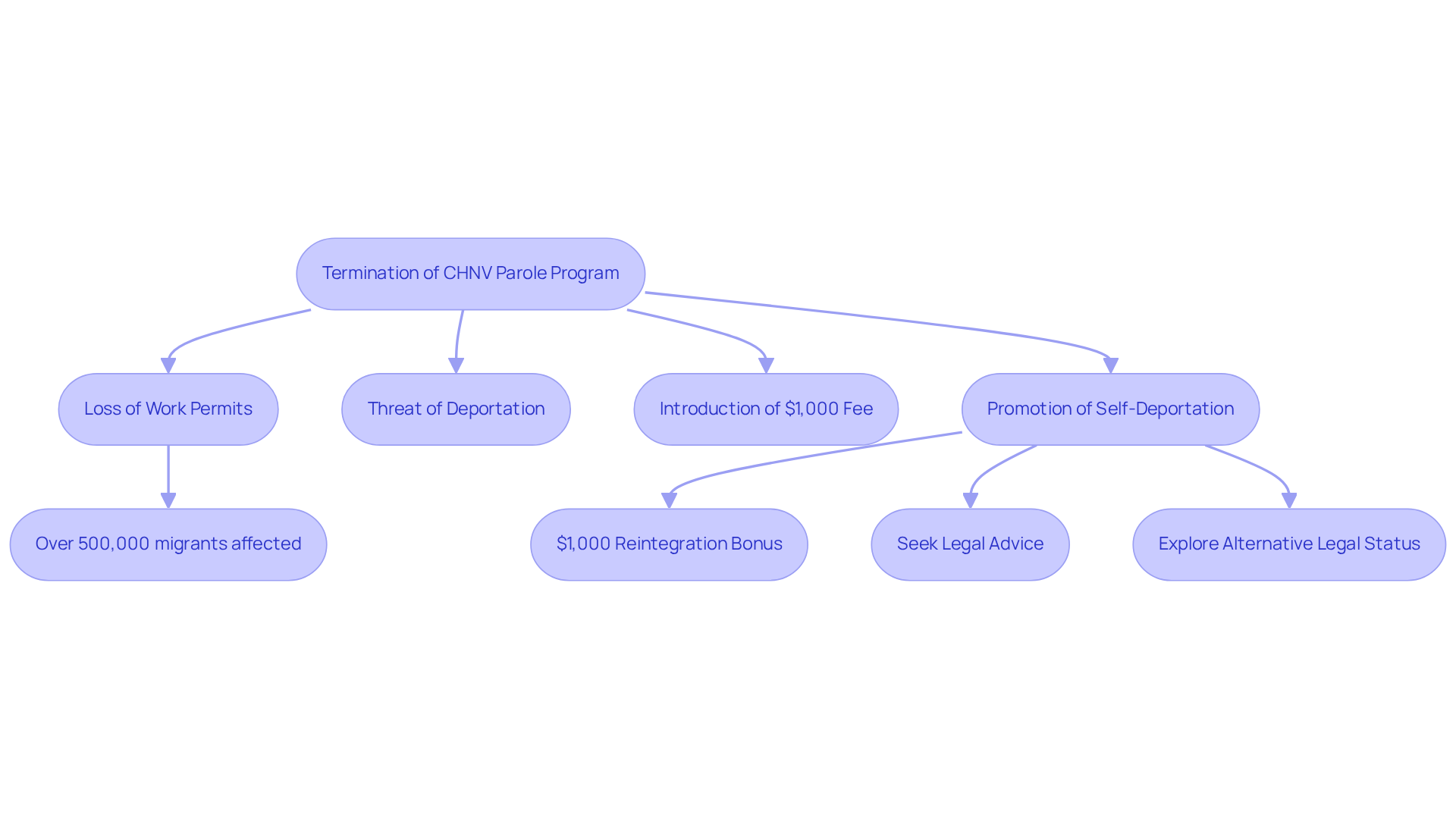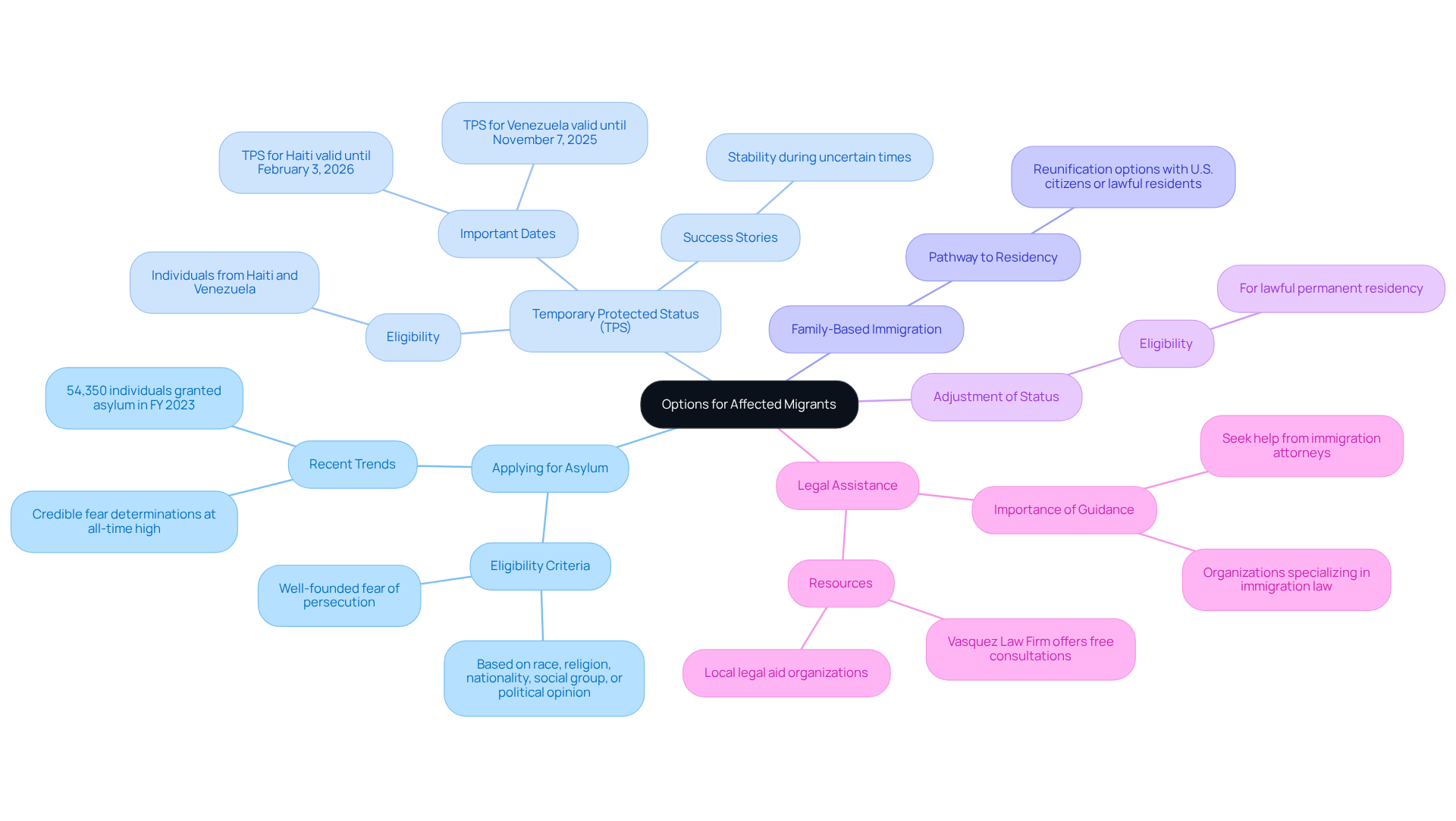Introduction
The recent cancellation of the CHNV parole program has sent shockwaves through the immigrant community. Individuals from Cuba, Haiti, Nicaragua, and Venezuela, who relied on this temporary relief to escape dire circumstances, are now facing uncertainty.
As U.S. immigration policy shifts dramatically, the implications for over 500,000 migrants are profound. Their livelihoods and the healthcare workforce they support are at risk. With the looming threat of deportation and new financial burdens, many are left grappling with a pressing question: what are the viable paths forward in a system that feels increasingly hostile?
This article delves into the impacts of this cancellation and explores the options available for those caught in this uncertain situation. We understand how overwhelming this feels, but you don’t have to face it alone. We’re here to fight for your family.
Overview of Humanitarian Parole for Cubans, Haitians, Nicaraguans, and Venezuelans
Humanitarian entry was established to provide temporary access to the United States for individuals from Cuba, Haiti, Nicaragua, and Venezuela facing urgent humanitarian crises. This initiative allowed qualified individuals to enter the U.S. legally, often with the support of a sponsor, and granted them work authorization for a limited time. It specifically aimed to assist those fleeing political instability, violence, and natural disasters, making it especially crucial for healthcare workers and other vulnerable populations seeking safety and stability in the U.S.
While the parole status was intended as a temporary measure, it enabled individuals to pursue more permanent forms of relief while residing in the country. However, recent policy changes have raised serious concerns about the future of these workers. The cessation of the initiative could lead to significant disruptions in the healthcare workforce, where immigrants make up nearly 30% of direct care staff.
Experts stress that ending such initiatives not only threatens the livelihoods of these workers but also jeopardizes the overall quality of care provided to vulnerable groups in the U.S. We understand how overwhelming this feels. It’s important to know you have rights, even if others tell you otherwise. We’re here to fight for your family.

Termination of the CHNV Parole Program: Reasons and Immediate Effects
The conclusion of the CHNV release initiative has left many migrants in a tough spot, influenced by political factors and legal hurdles that signal a significant shift in U.S. immigration policy. The previous administration raised alarms about the potential misuse of humanitarian entry, pushing for a stricter, case-by-case evaluation process. As of April 24, 2025, the declaration of parole humanitario cancelado under this program rendered all grants invalid, leading to the immediate revocation of work permits for countless individuals who depended on this status.
This sudden policy change, including the parole humanitario cancelado, has thrown over 500,000 migrants into a precarious situation, facing the looming threat of deportation or the loss of their status in the United States. The fallout from this decision reaches beyond individual migrants, impacting families and communities that have embraced these individuals, creating an atmosphere of uncertainty and distress. Have you ever felt lost in the immigration process? It’s crucial to consult an immigration attorney promptly for assistance, including deportation defense. The Vasquez Law Firm stands ready to offer comprehensive immigration services tailored to your needs.
Moreover, starting October 16, 2025, a new $1,000 fee will be required for humanitarian entry or re-entry, adding financial strain for those managing their immigration status. The Department of Homeland Security is also promoting self-deportation, offering a $1,000 reintegration bonus for migrants who opt for this route. These developments highlight the urgent need for those affected to explore alternative legal statuses, such as asylum, and to seek professional legal advice to understand their options. Remember, you’re not alone in this fight-your future matters to us.

Exploring Alternatives for Affected Migrants: Options and Resources
Migrants affected by the termination of the CHNV parole program face significant challenges, but there are important options to consider:
-
Applying for Asylum: If you can show a well-founded fear of persecution based on race, religion, nationality, membership in a particular social group, or political opinion in your home country, you may qualify for asylum. Recent updates reveal that credible fear determinations have reached an all-time high, highlighting the increasing number of individuals seeking protection.
-
Temporary Protected Status (TPS): Certain individuals from Haiti and Venezuela may be eligible for TPS, which grants temporary status and work authorization. Currently, TPS for Haiti is valid through February 3, 2026, while TPS for Venezuela under the 2021 designation remains effective until November 7, 2025. Success stories of those obtaining TPS underscore its vital role in providing stability during uncertain times.
-
Family-Based Immigration: If you have relatives who are U.S. citizens or lawful permanent residents, exploring family reunification options can be a pathway to residency and stability for your family.
-
Adjustment of Status: Eligible individuals can apply for adjustment of status to become lawful permanent residents, securing their place in the U.S. immigration system.
-
Legal Assistance: Navigating these options can be complex, so seeking guidance from immigration attorneys or organizations specializing in immigration law is crucial. The Vasquez Law Firm offers free consultations and 24/7 emergency support for personal injury and immigration cases. For prompt assistance, reach out to Vasquez Law Firm at 1-844-967-3536. Understanding the asylum application process is essential for those impacted by the termination of the CHNV parole program, as it can significantly affect their future in the U.S.
Additionally, resources such as local legal aid organizations, immigrant advocacy groups, and government websites can provide further support and information on application processes, ensuring that affected migrants are well-informed and ready to take the necessary steps.

Conclusion
The recent termination of the CHNV humanitarian parole program is a significant blow to many individuals from Cuba, Haiti, Nicaragua, and Venezuela who depended on this temporary status for safety and stability. This cancellation puts countless migrants at risk and threatens the quality of care within our healthcare workforce, where immigrants are essential.
Have you ever felt lost in the immigration process? This policy change brings immediate impacts, including the risk of deportation for over 500,000 migrants and new financial burdens. It’s crucial for those affected to explore alternative pathways like asylum, Temporary Protected Status, and family-based immigration. Seeking legal assistance is vital to navigate these complex processes.
We understand how overwhelming this feels. It’s essential for those impacted to know their rights and available options. The urgency of seeking legal guidance cannot be overstated; professional support can significantly enhance your chances of securing a stable future in the U.S. By staying informed and proactive, migrants can find pathways to safety and stability amidst uncertainty, ensuring their voices and needs are heard in this challenging landscape.
Remember, we’re here to fight for your family. Your future matters to us. Yo Peleo - We Fight.
Frequently Asked Questions
What is Humanitarian Parole and who does it apply to?
Humanitarian Parole is a program that provides temporary access to the United States for individuals from Cuba, Haiti, Nicaragua, and Venezuela who are facing urgent humanitarian crises.
What are the main purposes of Humanitarian Parole?
The main purposes of Humanitarian Parole are to assist individuals fleeing political instability, violence, and natural disasters, and to provide them with legal entry into the U.S. along with work authorization for a limited time.
How does Humanitarian Parole impact healthcare workers?
Humanitarian Parole is particularly important for healthcare workers and other vulnerable populations seeking safety, as immigrants make up nearly 30% of direct care staff in the healthcare workforce.
What are the potential consequences of recent policy changes regarding Humanitarian Parole?
Recent policy changes could lead to significant disruptions in the healthcare workforce and threaten the livelihoods of workers relying on this initiative, which may also jeopardize the quality of care provided to vulnerable groups in the U.S.
What rights do individuals have under Humanitarian Parole?
Individuals under Humanitarian Parole have rights that should be upheld, and there are resources available to support them, even in the face of challenges or misinformation.




